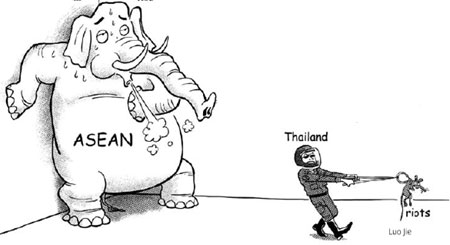
|
OPINION> Commentary
 |
|
Time for Thailand to pick up the pieces
By Kavi Chongkittavorn (China Daily)
Updated: 2009-04-17 07:44 For 72 hours, Bangkok was turned into a battleground for thousands of anti-government protesters, soldiers and police. Fortunately, the riots were brought under control on the third day without causing too many casualties. Skirmishes occurred between security forces and protesters that injured more than 120 people. Two people died from gunshots that came from squabbling between the anti-government protesters and local residents. The non-violent measures and soft approach adopted by the government under Prime Minister Abhisit Vejjajiva won kudos for the young leaders and security forces. It was a far cry from the past when the military and police used brute force to suppress street protesters, resulting in high death tolls. Just three days ago, Abhisit was heavily criticized for his decision to call off the Pattaya summit after the disruption by anti-government protesters, known locally as the red-shirt group, inside the summit's venue. At the time, the security forces did not show any effort to block the protesters from trespassing. Critics faulted Abhisit and his security teams for failing to take seriously the potential danger posed by the anti-government protesters. Some ventured to say that the military was no longer supporting him. Abhisit was concerned about the safety of foreign leaders attending the summit, fearing they could be targets of protesters. After the postponement, he declared a six-hour state of emergency in Pattaya and areas in its vicinity - long enough to allow the safe passage for all dignitaries. Now that peace has returned to the streets of Bangkok amid the traditional Thai New Year, or Songkarn Festival, the government is reassessing the whole situation, especially the long-term implications on the country's reputation and economic recovery. Domestically, Abhisit has to reach out to the poor in the North and Northeast region even though they have not supported the ruling Democrat Party. Most of them are followers of former Thai premier Thaksin Shinawatra. After the riots, this is the best time to establish rapport and trust with the poor. A decade ago, Thaksin, a billionaire telecom tycoon turn politician, captured the votes of rural poor with populist policies and measures. His unorthodox, quick-fix and benefit-based approaches to politics quickly turned him into one of the country's most popular prime ministers, enabling him to lead a majority government in early 2006 for the first time in Thai political history. During his reign, he had never shied away from any big-spending scheme, including huge packages of giveaways that aimed at keeping poor voters happy. Learning from the past, the Abhisit government has already implemented several populist measures such as universal healthcare, special bonuses for senior citizens, and free education for 15 years including textbooks and uniforms. It is hopeful that through political reform, the government can begin to address serious issues that polarized the Thai society in the past three years. An independent special committee on political reform will be established soon to recommend new ideas to make Thai politics more democratic and participatory. Within weeks and months, Abhisit has to deal firmly with those who broke the law, regardless of the political groups they belong to. Regionally, his tasks are equally difficult. Thailand needs to reassure ASEAN countries that Bangkok is ready to host the remaining ASEAN-related summits for the rest of the year. For the next eight months, Bangkok is scheduled to host the ASEAN foreign ministerial meeting and in October, the 15th ASEAN summit. Abhisit and his diplomatic team need to restore confidence among ASEAN colleagues and persuade disappointed East Asian leaders to return to Bangkok one more time. Further delay of cooperation between ASEAN and East Asia would hamper economic cooperation and recovery that has been on the drawing board. Non-Asian economies affected by the global financial crunch have looked toward the region as an example. At the London Summit in the UK early this month, Abhisit, on behalf of ASEAN, shared the past ASEAN experience in tackling the Asian economic meltdown.
 It is imperative that the Abhist-led government retains its current ASEAN chairmanship and reaffirm its commitment to host remaining summits. Bangkok has to work hard to regain the ASEAN consensus once more. ASEAN Secretary-General Surin Pitsuwan trusted that Thailand's resourcefulness would be able to put into good use and overcome all obstacles. He said the Thai government must immediately consult with the ASEAN Coordinating Council, which makes up all ASEAN foreign ministers, and the Jakarta-based secretariat on appropriate steps to be taken. Earlier, Indonesia became the first ASEAN member to express interest in hosting the East Asia Summit for Thailand. The urgency from an economic quagmire could force Thailand to pass on the privilege to other countries. Unless Thailand in the next few days can persuade ASEAN colleagues that peace and security has been restored and stability will be sustained, Thailand's chance to host remaining summits will be very slim. Beyond the region, Thailand needs to ensure that its economic infrastructure and investment have the support of the international community and financial institutions such as the World Bank and International Monetary Fund. Like many other Asian countries, Thailand has suffered from receding exports to the US and Europe, as well as dwindling foreign investment. Thailand must utilize the same kind of spirit and resilience shown during the economic crisis in 1997-98 to push for faster recovery. The economic malaise in the region is far bigger and more devastating than before. So it needs to cooperate with other East Asian countries to ensure their economic policies and planning are well coordinated and complementary with the rest of the region. The author is assistant group editor of Nation Multimedia Group, publisher of Bangkok-based English-language The Nation. (China Daily 04/17/2009 page9) |